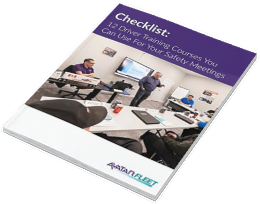![]()
Summer is here and with so much sunshine, driving has suddenly become enjoyable. The grey skies and wintery conditions are gone. Everyone is rolling down their windows, cranking up the radio and driving faster. Sadly, they’re also paying less attention to their primary responsibility: defensive driving.
This is a great time to discuss distracted driving. You’ve heard it a thousand times: distracted driving causes accidents. When we think of distracted driving, we usually think of people texting or messing around with their cell phones. True, this is a common and dangerous distraction. In fact, it’s more dangerous than driving under the influence of alcohol! But there are other distractions which are equally dangerous.
Distracted driving behaviors often become habituated. We all adhere to patterns of behavior. Our patterns of behavior, or routines, provide us with comfort because they have worked for us in the past. If a particular behavior works well, we repeat it until it becomes a habit. But sometimes, we develop unsafe behavior patterns. We take a risk, but nothing bad happens so we do it again and again. Scientific studies have proven that if we repeat an unsafe behavior enough times, it will always result in an accident.
Trying to multitask while driving is a perfect example of an unsafe behavior that is often repeated. It can range from fiddling with the radio, to eating a snack, or drifting into a daydream while driving. These behaviors can be just as dangerous as texting while driving. They take you eyes and mind off the road. There is no such thing as safe multitasking behind the wheel. Driving is not a passive activity. It requires attention and vigilance.
Yet people attempt to multitask all the same. They take risks. They accept those risks as the “small price” to pay to get a reward. For example, I may choose to take my eyes off the road for a brief moment to look at an incoming text. The risk seems small. After all, it’s just a quick glance. The reward is obvious to me. I get to see the message. The risk is not so obvious. Sadly, most of us have become slaves to our cell phones. We can’t bear to wait for that next communication, even through 99% of the messages are pathetically unimportant.
Distracted driving inevitably leads to accidents. But remember, these behaviors are conditioned. They’re the result of repeated behavior-reward cycles. So, the opposite is true as well. If we reward our drivers for attentive driving, they can learn to drive safer.
It’s our job to teach drivers better driving behaviors. AvatarFleet does that using the most modern and effective defensive driving system in the world, LLLC. Please, join with us and educate your drivers about the risks of distracted driving. Make them aware that just one second of inattention can change their lives forever.
Make them aware of the three types of distracted driving:
- Manual Distractions: Anything that removes your hands from the wheel, like eating),
- Visual Distractions: Anything that takes their eyes off of the road
- Cognitive Distractions: Anything that forces the to think about anything other than driving.
LLLC Defensive Driving forces drivers to focus on the environment all around them. In addition to LLLC, there are also some other great programs out there, such as The A-Fleet that teach drivers how to negotiate specific situations such as adverse conditions or intersections. Please check out a demo of this program. You’ll be glad you did.
Prevent distracted driving and reduce accidents. You can keep your drivers and others safer on the road. Why accept the risk of distracted driving? There’s nothing to gain and everything to lose.
Please help us make the world a safer place.
Sign up for our newsletter
Get the latest articles on all things transportation delivered straight to your inbox.
Schedule a live demo

